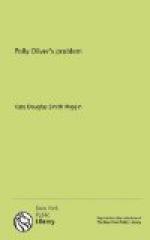“As I have told you before, the money is set aside for that special purpose, and the work will be carried on by somebody. Of course I can get a substitute if you refuse, and that substitute may, after a little time, satisfy the impatient children, who flatten their noses against the window-panes and long for Mias Pauline every day of their meagre lives. But I fear the substitute will never be Polly! She may ’rattle round in your place’ (as somebody said under different circumstances), but she can never fill it! Why not spend the winter with us, and do this lovely work, keeping up other studies if you are strong enough? It will be so sweet for you to feel that out of your own sadness you can comfort and brighten the lives of these lonely, suffering children and these motherless or fatherless ones. It will seem hard to begin, no doubt; but new life will flow in your veins when you take up your active, useful work again. The joyousness that God put into your soul before you were born, my Polly, is a sacred trust. You must not hide it in a napkin, dear, or bury it, or lose it. It was given to you only that you should share it with others. It was intended for the world at large, though it was bestowed upon you in particular. Come, dear, to one who knows all about it,—one whom you are sweet enough to call
“YOUR FAIRY GODMOTHER.”
“Mrs. Noble,” said Polly, with a sober smile, “the Ancon sails on the 20th, and I am going to sail with her.”
“So soon? What for, dear?”
“I am going to be a banian-tree, if you please,” answered Polly.
CHAPTER XV.
LIFE IN THE BIRDS’ NEST.
Polly settled down in the Birds’ Nest under
the protecting wing of Mrs.
Bird, and a very soft and unaccustomed sort of shelter
it was.
A room had been refurnished expressly for the welcome guest, and as Mrs. Bird pushed her gently in alone, the night of her arrival, she said, “This is the Pilgrim Chamber, Polly. It will speak our wishes for us.”
It was not the room in which Polly had been ill for so many weeks; for Mrs. Bird knew the power of associations, and was unwilling to leave any reminder of those painful days to sadden the girl’s new life.
As Polly looked about her, she was almost awed by the dazzling whiteness. The room was white enough for an angel, she thought. The straw matting was almost concealed by a mammoth rug made of white Japanese goatskins sewed together; the paint was like snow, and the furniture had all been painted white, save for the delicate silver lines that relieved it. There were soft, full curtains of white bunting fringed with something that looked like thistle-down, and the bedstead had an overhanging canopy of the same. An open fire burned in the little grate, and a big white and silver rattan chair was drawn cosily before it. There was a girlish dressing-table with its




